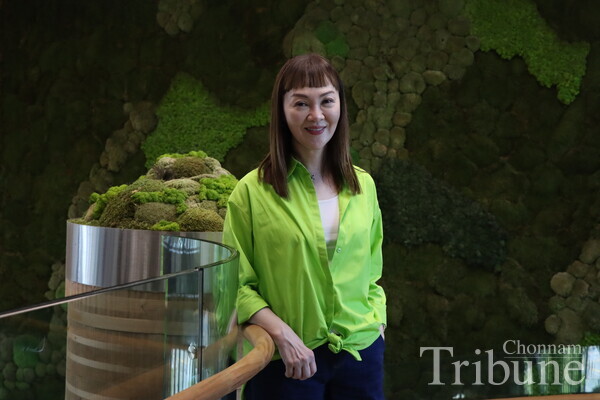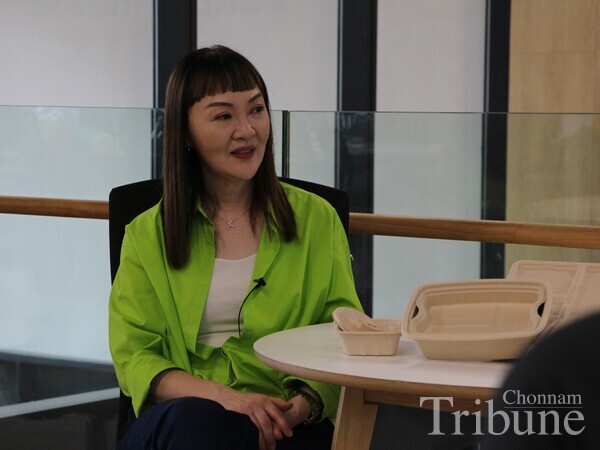
Due to increasing environmental pollution, it has become notable to find ways to manage human-generated waste effectively. 'Alterpacks' turns spent grains into food containers, which could be alternatives to disposable items. Karen Cheah, the founder of 'Alterpacks,' established the start-up after completing her Master of Science and Innovation (MSc) at Singapore Management University (SMU), where she was on the Dean's List and Leadership Scholar. Despite the intense competition and challenges she faced, Karen never gave up. She merely keeps studying and finding what she can do. Then what makes her do so? The Chonnam Tribune conveyed an inspiring story of her journey heard at the university on January 15.
Q. Could you introduce yourself and 'Alterpacks'?
Hi. I am Karen, the founder and CEO of a new materials company called 'Alterpacks.' Our company uses disposed food byproducts and agricultural waste to create a new material that looks and feels like paper and cardboard, but it is actually 100% organic waste. Our technology allows us to extract the plant fibers from these waste materials. We are also expanding the range of agricultural waste as our technology progresses.
Q. When did you first come up with this idea? What motivates you to work for the environment?
'Alterpacks' came about because I had to complete my MSc at SMU. The Capstone project requires you to make a hypothetical start-up. They pose a simple question. "If you could solve a global problem while money is not an object, what problem do you want to solve?" From all my travel experiences, the one problem I saw in all these communities was the garbage problem. Many are food waste, food byproducts, and agricultural waste. That was the problem I wanted to solve to be able to transform and do something about the plastics problem.
Q. Could you share the story of the process of your entrepreneurship?
When I was doing my MSc while working for a global media company, I just wanted to make changes in my company, not to run a business. But when you see the fruition of the challenge in your start-up, you realize you can make a difference if you are prepared to take that risk. "It comes with the risk." I gave up my job and decided to do this full-time work to create Alterpacks. It's not just saying you must get rid of your full-time job. Prepare yourself first. SMU helps me to prepare well, telling me about the risks and the opportunities.
One of the opportunities for me was the Business Innovations Generator (BIG) from SMU's Institute of Innovation and Entrepreneurship (IIE). I received the grant, office space, mentorship, and a network of fellow global entrepreneurs. After I got a grant from BIG, I opened a laboratory in my house and used the grant to buy equipment and hire a researcher. And those were the baby's first steps.
Q. Did you do your project alone? Or do you have teammates?
When you pitch at BIG for a grant, it is better to have a team. Because if you're the only person, the committee will ask, "How can you do everything on your own?" It also implies that your idea can't attract other people. So, teammates are another evaluation point. While doing a capstone project, you should present your idea to the entire class. It's up to your classmates to decide whose idea they want to join. You then get teammates from your class. Also, the class at SMU is an international mix. So, it's an opportunity to get to know people from other cultures. However, you should check that you have the right team mix and that everybody can provide that contribution. That's part of the assessment as well.
Q. What led you to SMU?
My bachelor's degree is from the National University of Singapore (NUS) in mathematics, and my honours degree is also from NUS in history. After graduation, I worked with global media companies. I reached a particular point in my career where I wanted to make changes. So, I decided to study the innovation field.
I was looking through the curricula and all the different modules, and SMU was the one that appealed to me the most. When I got into the program, they told me about several scholarships I could apply for. There is always lots of help along the way. At that time, I did not think to quit my job. So, I need to strike a balance between work and studies. At SMU, it was possible to do so.
Q. Starting a business on your own is an arduous journey. Despite the difficulty, what mindset helps you undertake this tough challenge?
It's like somebody says there are three steps to being an entrepreneur. You have to have enough skepticism. And then you have a certain level of cynicism. But the other part of being an entrepreneur is having blind faith. Just because it has not been done before doesn't mean it cannot be done. The most satisfaction comes when you hold a prototype and say, "See, it can be done."
The journey of an entrepreneur is not easy. One, don't fall in love with your idea. Two, be very open to all the comments and feedback people give you. But, three, don't fall into the trap of just listening to everybody and start to doubt yourself. So, you have to have that confidence but not be arrogant. Every day is a problem-solving day. So I say, "This too shall pass. I need to figure out how to get over this hurdle." Then I can go on again.

Q. What kind of assistance did you receive from SMU before starting your business and until now?
I could still knock on their doors, and the lecturers would always be supportive. They would ask what problem I had, and then they would always try to help. If they are not professionals in that field, they could find another professor who could ask for help. So it's always about the network. The university provides you with this whole infrastructure, which you may be very unaware of, but there is a network of support. BIG also taught us about different competitions, and you're also being given a mentor to help you prepare. We won Temasek Ecosperity Fund, and that was crucial to our step up as a startup.
Q. What kind of effects did this kind of external support for your business and so on have on you?
Participating in competitions is a humbling experience because you realize that there are so many amazing ideas and better solutions than mine. Also, it makes me feel like "I need to work better! I need to get harder! I need to figure out a way to improve this." But when you win the competition, you get such mentorship and support.
It is a precious experience because being a founder is a lonely journey. If some difficulty occurs, I can go to the incubation center and ask, "Have you guys faced this before? Will you be able to help support me in this?" That's always a solution, but it might not be the best. However, at least you have somebody you can talk to and who can give you some advice and guidance.
Q. Is there anything wistful about participating in entrepreneurship modules at SMU?
Sometimes you feel that some of the modules you're taking don't make any sense to you. For example, I had to take an accounting module. On the first day of the lecture, I put up my hand and told my lecturer, "Sir, why do we have to do accounting? Because it is going to be replaced by AI anyway." Then he gave the best answer that put me in my place. He said, "Before you want to replace something, you better know what it's about. Do you know anything about accounting? No. So start learning."
So you might come across strange modules. Some would work better than others, and some might find it a waste of time. But it's okay. Just move with the flow.
Q. What makes students come to Singapore to run a startup or study?
I think learning in a great mix is valuable. You also realize that when you have international students, you can actually look at problems and solutions in a very different manner. So you're no longer a little fish in one pond. You are a small fish, but we are all going into this ocean together. So that's important.
Q. What are the benefits of running a startup business, especially in Singapore?
As a founder and also as a Singaporean, I can't think of a better place to have a startup than Singapore. I'm prejudiced because I've benefited so much from my universities. The networking, but also the whole structure of Singapore and the government support, are invaluable for startups. There are numerous opportunities.
The process of opening a company was very easy and seamless. As long as you follow the law and declare everything properly, you can get opportunities for grants and funding. Additionally, you can identify the areas that the government and international governments are interested in and see the level of competition you are up against.
But in Singapore, what's great is that you also have this international environment and all these different opportunities that come your way, as long as you're willing to work very hard for them. Let me phrase that the opportunities are endless as long as you are prepared to work hard for them.
I would also say that when I sit here, it brings back memories just to let you know that area used to be a meeting room like it's a really big meeting room. One of the most important meetings we had as a startup was in that meeting room with a government agency. Singapore is a small country, so you get this amazing opportunity to work on pilots with real-life challenges that the country needs.
You have such an international mix of people coming to Singapore and the opportunities are great, then you actually get to pilot with industry partners, and you also get exposure. That is very important for a startup.
Q. In Korea, many students are afraid of starting their own business. They tend to strive for stability. It often leads to missed opportunities when students become too afraid to take risks, even when they have ideas. As a CEO, could you share some advice with students who are hesitant to pursue entrepreneurship?
It's not about being afraid to take a risk; it's really about being prepared before you jump. Being a founder is really like running a marathon. You just don't jump out of bed and say I'm going to run a marathon. You're going to take baby steps and get shoes, an outfit, a diet, a strict exercise plan, and finally train.
I think people forget that entrepreneurship isn't like, 'I want to be an entrepreneur; let's just go for it.' There are a lot of steps in preparation. It's fine if you don't want to take that big jump straight away. Go into a corporate job. That is good too. Earn money, get experience, and learn as much as you can from that corporate job. I was in a corporate career for so many years before I decided to make that jump. So, give yourself that time, but don't take too long.
After I graduated, I had a career of nearly 20 years before I went to do my masters again. Then, once I decided to do the startup, it took me a year of preparation before I could even do it. And even now, I always feel that I should have prepared even more.
By Jung Da-gyo, Editor-in-Chief

